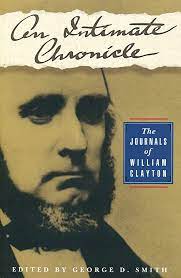Articles/Essays – Volume 25, No. 1
A Man for All Seasons | George D. Smith, ed., An Intimate Chronicle: The Journals of William Clayton
The William Clayton journals elevate Signature Book’s series of nineteenth century Mormon diaries to a high level of primary documentation. Although excel lent biographies of Clayton have already been published, George D. Smith has brought six specific journals together in a single volume. The result is an in-depth view of a unique Mormon life between 1840 and 1853, one of Mormonism’s most dynamic periods.
Clayton’s own words take us from his conversion to Mormonism in England, through his transatlantic crossing, to his position as Joseph Smith’s private secretary in Nauvoo. George Smith also chronicles Clayton’s 1847 migration to Utah, his polygamous activities, and a missionary journey to England in the 1850s. Clayton lived twenty-six years after these journals end, yet Smith’s exceptional introduction gives both context and perspective on his entire life in a biographical sketch. The author’s history of the edited documents is beneficial as well. Elaborate notations throughout the text, utilizing a vast array of complementary sources, add significantly to an understanding of the journals and the man who wrote them. The book’s appendices, which include a number of notebooks, private books, extracts from writings, and Clayton’s written testimony of Joseph Smith, the Book of Mormon, and later leaders, are also helpful additions.
Clayton’s view of the amazing internal workings of Church leadership in Nauvoo is fascinating, as is his lengthy discussion of the building of the Nauvoo Temple. An in-depth reading of these documents adds significantly to an understanding of Mormonism during a number of internal and external crises.
Clayton’s journals depict the life of a man at the footstool of power who was involved in polygamy at an early stage and who obviously believed in the doc trine, felt he should be an exemplary practitioner, and influenced many others to do likewise. His unabashed pursuit of some young women is rather startling and underscores his fervent belief that a righteous posterity was the key to celestial realms. Ten women married him, and he fathered forty-seven children. Though Clayton never reached the highest level within the Mormon hierarchy, that of General Authority, he did serve on the Council of Fifty, which had hopes of world government. He discussed all of these activities very openly in his journals.
George Smith’s careful and detailed presentation of these journals sets a new standard for Signature Books’ series of journals. His attention to detail, much like George Ellsworth’s in The Journals of Addison Pratt, demands elevated standards for editors and publishers. To provide complete historical context, editors of diaries, as Smith has done here, should meticulously research their material, examining and noting contemporary sources.
The fascinating details of a life spent in the councils of Joseph Smith, Brigham Young, and other Church leaders—summaries of discussions, off-hand conversations, and reactions to revelatory decisions—give readers a great feel for William Clayton and his times. It is unfortunate that the high price of this edition may limit the number of readers who have access to Clayton’s universally appealing story.
An Intimate Chronicle: The Journals of William Clayton edited by George D. Smith (Salt Lake City: Signature Books, 1991), introduction, 510 pp., appendices, index, maps, illustrations, $75.00.


 Back to full Issue
Back to full Issue

